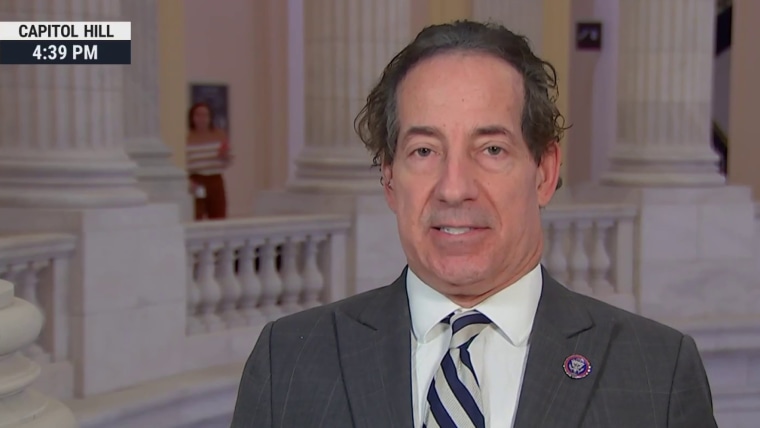UPDATE (Dec. 19, 2022, 4:30 p.m. EST): On Monday, the House committee officially voted to approve multiple criminal referrals, including for former President Donald Trump.
The House Jan. 6 committee’s expected criminal referrals are just that — referrals. If you’re expecting them to automatically lead to charges against former President Donald Trump, you should temper your expectations.
It might seem as if there’s some special legal significance to official pronouncements from a high-profile congressional committee that’s investigating a grave matter. But the committee can’t force the Justice Department’s hand. At the end of the day, prosecutors have the discretion to bring charges, regardless of who does or doesn’t recommend them.
As former U.S. Attorney Preet Bharara for the Southern District of New York told NBC's "Meet the Press" earlier this month, a criminal referral is “largely symbolic” and “doesn’t do anything” for the Justice Department.
Even committee member Adam Kinzinger, an Illinois Republican, has conceded the symbolic nature of referrals.
That can make referrals seem unnecessary, including ones against Trump that the committee has reportedly considered. We know that the Justice Department is already investigating the former president on multiple fronts (saying nothing of state probes). After Trump announced last month that he’s running again in 2024, Attorney General Merrick Garland appointed special counsel Jack Smith to oversee two investigations into Trump — and reporting suggests that Smith isn't wasting any time. In appointing Smith, Garland said he would "ensure that the Special Counsel receives the resources to conduct this work quickly and completely." So it would be odd if anything that the committee highlights — especially about Trump or other major Jan. 6 players — is news to the Justice Department when it comes to matters that the department has been investigating.
The House Jan. 6 committee is holding its final public hearing on Monday, Dec. 19 at 1 p.m. ET. Get expert analysis in real time on our live blog at msnbc.com/jan6report.
However, it’s possible that a referral could be more meaningful if it involves allegations directly related to the committee — such as perjury, contempt or witness tampering. Recall the case of former Trump adviser Steve Bannon, who was convicted of contempt of Congress in July after he blew off the committee. With Bannon, the House passed a resolution asking the Justice Department to prosecute him. Even then, prosecutors didn’t have to take the case.
When it comes to criminal charges, it’s the Justice Department's call.
You get the point. When it comes to criminal charges, it’s the Justice Department's call. As with any case, that call will, at least in theory, be based on whether prosecutors think they can prove their case beyond a reasonable doubt. If anything, with the scrutiny that will be on any case against Trump in particular, prosecutors will want to be extra positive that they can prove their case at trial before bringing charges.
Given that it’s the Justice Department's call, and that the committee won’t necessarily be providing prosecutors with new information, there’s a view that a referral could be worse than meaningless — even counterproductive. Criminal law professor Randall Eliason noted last year in The Washington Post that Garland was “working to restore the Justice Department’s reputation for keeping politics out of criminal prosecutions.” With that in mind, Eliason argued:
If Congress injects itself into the criminal process, it could make Garland’s job more difficult. It would be that much easier for Trump to claim that any later prosecution was a political witch hunt and that Garland was simply carrying water for House Democrats.
If Trump or anyone else is inclined to go the “witch hunt” route, then they’ll find a way to get there. On the flip side, there will no doubt be people upset with the Justice Department if it doesn’t charge Trump, no matter what the committee finds or says. Ultimately, the Justice Department must make decisions based on the evidence, knowing that criticism will come either way.
It's true that criminal referrals could add public pressure, as could any committee recommendations to state bar or ethics bodies. But they still won't be legally binding. In the end, like the committee’s hearings and the final report that’s expected this week, their biggest value may lie in educating the public, regardless of what the Justice Department decides.

